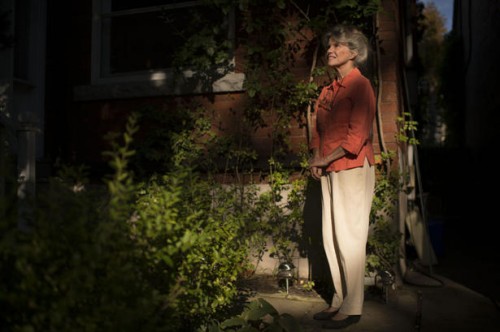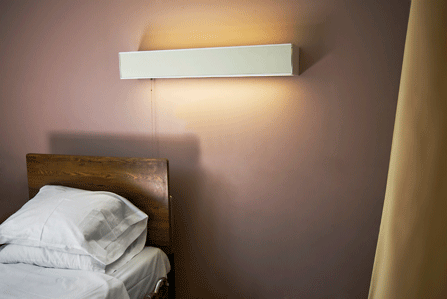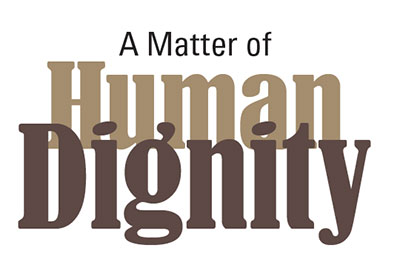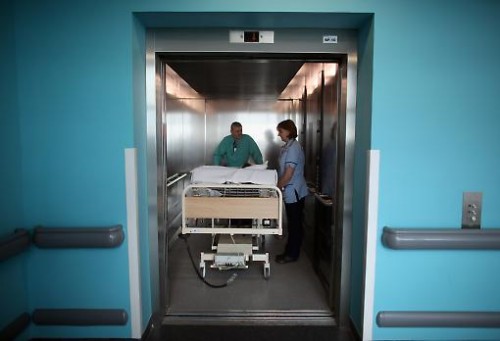By Robert Cribb
Reaching beneath a desk in her home office, Ruth von Fuchs pulls out a white plastic box containing a collection of tubes, valves and microwave turkey roasting bags.
This is her death kit.
With the blasé patter of an airline attendant explaining the protocols of oxygen mask use, the 71-year-old retired librarian removes a microwave bag and pulls it over her head, her face shrouded beneath clear plastic, her features blurring, her graying bun compressed into a soft helmet.
Slowly, her fingers begin to pinch a seal around her neck using Velcro strips she attached at the open end of the bag.
Her voice muffled and faint, she points to the spot where a tube is to be inserted.
“I would probably use helium,” she declares, deadpan. “A few deep breaths and you fade off.”

Von Fuchs is death’s midwife.
On four occasions, she has held the hands of terminally ill Canadians as they lived out their final wish: to pre-emptively end their lives with someone, anyone, there to provide humanity as they breathe their last breaths.
“No one wants to die alone,” says von Fuchs. “Most people just want someone there to hold their hand.”
She sits with people suffering with incurable diseases or perhaps their family members who wish to be with them if they take their own lives. She will pull out the visual aids, reveal her collection of items and explain how each works.
Down the road, when she decides the time is right, she will pull the kit out from under her desk one last time for her own do-it-yourself death, she says.
Whether von Fuchs is breaching Canadian criminal law prohibiting “assisted suicide” is a question mired in the complexities of legislative language and the mysteries of human desire.
Here’s what is clear: an underground movement of death facilitators has emerged to help Canadians execute their final wish despite threats of arrest and imprisonment.
Clandestine “hastenings” — self-planned deaths generally performed in private homes using drug cocktails or makeshift helium hoods — are a quietly growing phenomenon.
And experts say that growth can only continue as the country’s population ages and political intransigence continues to deny legalization of euthanasia and assisted death.
Interviews with six Canadians planning their own deaths reveal a perspective many of us can’t understand.
It is a state of mind guided by the inevitability of a physical deterioration so brutal and terrifying they have reached a desperate but unshakable conclusion: that surrender into final sleep is preferable to a descent into anguish.
Reaching that point comes after thoughtful — and often agonized — reflection, they say.
Once they are there, Canadian law makes it all the more complicated for them to follow through.
Finding someone to help means subjecting friends, family members or physicians to the possibility of a prison sentence.
Von Fuchs and other right-to-die believers have mapped out a legal grey area rife with life-and-death questions the courts and Parliament have yet to clearly answer.
At its core is this: who has the right to choose when and how we die?
“I think its one of the most profound issues of human rights of our time,” says Jocelyn Downie, a leading Canadian health law expert at Dalhousie University and author of Dying Justice: A Case for Decriminalizing Euthanasia and Assisted Suicide in Canada.
“I think we could be at the very moment of transformation.”
Public debate has re-emerged of late over Canada’s criminal prohibition on assisted death and euthanasia, with some prominent calls for legalization of assisted death in Canada from physicians, lawyers, politicians and ordinary Canadians.
Meanwhile, the federal government and most medical bodies remain vehement in their opposition to legislative change that would open the door to assisted killing.
All of that public debate has ignored this truth: despite criminal laws and social taboos, many Canadians are already choosing to end their lives with assistance from friends, physicians and, increasingly, a network of volunteer death supporters.
No one knows how many are secretly planning and executing their own deaths each year with support from others.
But those who bear witness say clandestine deaths are an increasingly attractive choice for terminally diseased Canadians who can no longer wait for legal authorization to end their lives.
“It’s just right that people have the opportunity to be autonomous and self-determined and less subject to the odious constraints of a state that would say, ‘We’ve spent so much time fighting death that we confer upon you a duty to live,’ ” declares Russel Ogden, a Vancouver criminologist who attends hastenings for Canadians who choose to end their lives.
The act of comforting the afflicted by helping them breathe their last breath is a tightrope walk performed in the shadows.
Generally executed in private homes, the process is legally complex and can be medically dicey.
Those who wish to take matters into their own hands must go about the grim process of illegally importing lethal drugs, in some cases from foreign websites, or piecing together equipment from items purchased at grocery or hardware stores.
Supportive death hasteners tend to operate quietly behind the scenes. All are nervous about attracting the attention of authorities.
In interviews, eight Canadians who have attended hastenings, ranging from an atheist physician to a retired United Church minister, were all careful to say they “support” — not “assist” — people they call “clients.”
The practical distinction may be subtle.
But it holds tremendous legal consequence.
While “assisting” a death is a criminal offence, “supporting” appears to be a sufficiently muddled concept to escape prosecution.
Police have questioned most of the eight, but no charges were pursued.
For those who wish to die, that provides little comfort.
Inside the system’s shadowy cracks, some Canadians attempting suicide fail in ways that leave them in worse condition than they were.
Some refuse medical treatment that would ease excruciating and intractable pain.
Others seek out people like Ruth von Fuchs.
Ask discreetly in right-to-choose circles and you’ll eventually hear about von Fuchs.
Visit her on a quiet west-end Toronto street and you’ll discover an elegant woman, her still-youthful face framed by a dramatic sweep of silvery hair pulled into an updo.
She’ll take you upstairs to a small second-floor office nook where she sits surrounded by overstuffed shelves containing books with titles such as A Good Death, Last Rights and ThePeaceful Pill Handbook.
At various times, two tabby cats and a couple of American Eskimo dogs will sniff at you as she speaks for an hour uninterrupted about the art and politics of self-prescribed death and how Canadian laws designed to protect life have created anguish.
“The knowledge that tomorrow will not be better than today — and likely worse — that is a type of incurable misery,” she says of a belief reinforced while she watched her partner of 21 years suffer through a long and wrenching battle with cancer in 2009.
“He didn’t give up soon enough. He had a failure of realism. I don’t want to go through a period of increasing decrepitude. I don’t want to lose my ability to know when to fold.”
Like those who share her beliefs, von Fuchs displays none of the discomfort many of us have with death.
“You can buy the helium tanks used for blowing up balloons at most Toys R Us stores,” she advises practically. “I’m a fan of using all the available technology.”
Things can go wrong, of course, when you’re relying on discount department store items to execute your final wishes.
“It’s tricky,” she warns. “You have to practise.”
Von Fuchs was recently contacted by an 87-year-old Ontario woman with multiple health issues who wishes to “go while the going is good.”
In a rare twist, the woman was referred to von Fuchs by her doctor.
“That doesn’t happen often,” she says. “But there are doctors who understand and want to provide this service to patients who need it and want it.”
Hasteners typically hold a view of death sanitized of religious or spiritual meaning.
Von Fuchs is a lifelong atheist who rejects the cultural celebration of courage in the face of disease.
She has no children to be impacted by her choice.
“My father died when I was 10 and I think that kept me from thinking that death was distant and out there,” she says. “I was made unable to have that delusion.
“People say you should always be hopeful. That’s foolishness. Just as there are unjustified fears there can be unjustified hope. Neither is good. We let people horrified by hopelessness endure a type of torture.”
The question of assisted death and euthanasia is more charged today than perhaps at any other point in Canadian history.
Public opinion polls show strong support for their legalization.
In a recent groundbreaking decision — now under appeal — a B.C. Supreme Court judge found in favour of Kelowna-area woman named Gloria Taylor, who was seeking the help of a physician to end her life in the face of her ALS (she died earlier this month of natural causes).
And both a Quebec commission and a Royal Society of Canada expert panel recently urged politicians to provide greater protections for Canadians who wish to end their own lives.
Quebec is promising to establish more lenient provincial laws that could give doctors and their patients a degree of latitude that could result in a form of assisted suicide without prosecution.
“We’ve never been so close to a permissive regime,” says Downie. “If Quebec goes through with what it has said it will do, that will be transformative for Quebec, and then I think you’ll see a domino effect across the country. That could be the pivot moment.”
But resistance also remains vigorous.
The medical profession and successive federal governments have firmly rejected calls for change, affirming that assisted death is both unethical and criminal.
When a private member’s bill proposing to legalize assisted suicide was introduced in 2009, it was overwhelmingly defeated by a vote of 228 to 59.
Anti-euthanasia organizations also hold powerful voices in the debate, arguing that legalization of self-engineered deaths will create a slippery slope that could end with vulnerable Canadians being pressured by their families or their physicians to choose assisted death.
“While I can cause my own death, the question is whether there should be a line in the sand for someone else causing my death,” says Alex Schadenberg, executive director of Canada’s Euthanasia Prevention Coalition.
“Our answer is, ‘Absolutely.’ You can’t always be assured you’re safe when someone else has influence over your death.”
Schadenberg, who has an autistic son, was drawn to the anti-euthanasia movement in the late 1990s, inspired in large part by raging public debate over the death of Tracy Latimer at the hands of her father, Robert.
“What made me particularly concerned was the vulnerability of persons with disabilities and the growing public tolerance for euthanasia and how it might impact people with disabilities.”
Latimer was released from prison in 2010, a decade after the Supreme Court upheld his conviction for assisting in the death of his severely disabled 12-year-old daughter.
It remains an object lesson of the kind of high-stakes legal fate that Canada’s right-to-assisted-death supporters are trying to delicately negotiate.
But more than ever before, advocates across the debate seem to agree we have reached a defining moment on the question of assisted suicide.
And the emergence of a death-hastening movement is perhaps the most conspicuous sign of the underground rebellion.
“The culture is definitely changing on this,” says University of Toronto bioethicist Kerry Bowman. “If people want this service and people are willing to provide it, and it’s done in an objective way, it’s coming from the people. There’s no way that any of this could be part of direct health-care system. It would be too much of a conflict from an ethical point of view.”
Vancouver-based Ogden has been researching assisted death as a criminologist since 1991 and began pushing for legal reform with the birth of his Farewell Foundation last year.
Behind the political advocacy, he’s also quietly performed the far more ethically thorny work of supporting those who can’t wait for the legal and political debate to play out.
He has attended the deaths of five Canadians and an American who decided that suicide was preferable to a life lived with incurable disease.
Each was a relative stranger to him — no childhood bonds or family ties. He generally gets to know them over a series of conversations spanning up to a year prior to their death.
He accompanied them to a place of their choosing, in one case a Swiss medical clinic called Dignitas that specializes in legal assisted suicides.
In each case, he watched as they swallowed a cocktail of drugs or inhaled helium they had independently acquired to complete the deed, he says.
In the moment, he was a quiet presence, a witness, observing as their final breaths gradually faded into silence.
When it was over, he typically picked up the phone and called the authorities to report the death.
“They’d like their deaths to be documented for what they are to law enforcement and the coroner,” he says. “We’re prepared to do that.”
After studying assisted suicide for two decades, he believes what he is doing is both legal and desperately needed in Canada.
Nobody, including police, seems to be able to prove otherwise.
“There’s no obligations for citizens to live lives that they believe aren’t worth living. We’re not bypassing any law. We’re trying to act within it.”
Does counselling someone in the methods of committing suicide qualify as assistance? What about providing the equipment or medications?
Ogden will do neither, he says.
But how, say critics, can death hasteners like Ogden ensure medically safe procedures or assess the mental capacity of those vowing to end their own lives as lay people without medical or psychological training?
According the Farewell Foundation’s procedures, those seeking assistance meet with a support team to ensure they are capable of making the decision.
“If a member’s capacity is in doubt, greater scrutiny and additional consultation is necessary,” the policy reads. “The support team must take care to ensure that a decision for self-chosen death is informed and voluntary.”
The methods chosen for those deaths must be “humane and non-violent” in order to “prevent impulsive acts.”
Ogden says not everyone who seeks supports receives it.
“I’ve looked at situations where people were planning their death and told them, ‘If this is the way you’re planning to end your life, I wouldn’t be willing to attend.’ What we are advocating is people taking advantage of humane, non-disfiguring methods and that they do their own research on how to carry out the various steps. It’s about personal responsibility.”
If the foundation agrees to attend at a death, at least two members will be present at the appointed time and place, and its policies require reporting to the coroner.
Ogden concedes that his members are not trained professionals.
“We don’t see a need for training because the person doesn’t need to know how life is ended because they aren’t going to be involved. The core requirement is to sit on your hands. It would be a violation of the law to intervene. If someone is struggling to end their life and you step in and finish the job, that’s murder.”
No matter how controversial it may be, a death wish appears to be worth the risk for many Canadians.
Five members of the Farewell Foundation have taken their own lives since August, says Ogden. While each consulted with him on their plans, they ended up committing suicide without his assistance.
Toronto-based Dying With Dignity, a registered charity that supports Canadians on right-to-die issues, receives more than 200 calls a year, many from people seeking information about how to end their own life.
Wanda Morris, Dying With Dignity’s executive director, says the experience of bearing witness to a death hastening last year has only reinforced her convictions.
“Just to witness the gratitude this person had . . . I really get that there is some suffering that only death can end,” she said.
Morris was drawn to this work in the aftermath of her father-in-law’s chilling death.
In the end, the dementia that stole his cognitive abilities also made him violent.
One day, he struck out at his daughter, who was taking care of him, hitting her across the face, she says.
Then came the nursing home and the restraints.
“My husband said, ‘You can’t ever let something like that happen to me,’ ” she recalls, wiping her eyes. “I love my husband dearly, so I decided I had to get informed and see what our choices are.”
Those choices remain limited in the mainstream health-care system, which views the work of amateur death hasteners with suspicion.
When Morris recently approached the Ontario College of Nurses seeking help in finding nurses interested in helping clients end their lives, the response was definitive.
“The (College of Nurses of Ontario) has stated that euthanasia and assisted suicide is illegal, and there is no role for nurses in facilitating these activities,” the college responded in a letter of response to Morris.
Linda Marie Pacheco, a palliative care nurse in Toronto, wanted to apply for the job.
But she was told by her college that doing so would risk her licence, even if she wasn’t hired as a registered nurse.
“They’re saying no matter what job I do, if it’s in the field of health care, I have to uphold he rules of the college,” she says. “That surprised me.”
After two decades of caring for patients with intractable disease, she was drawn to the notion of educating people about their options, providing alternatives, ensuring they don’t make botched attempts at suicide that could leave them even worse off.
“I can’t stand by and let people suffer,” she says. “I see these people as angels of mercy to help alleviate suffering. I’ve been at the bedside of many people in anguish and it’s horrible. I got excited about being able to give these people the education they need and respect their rights as a human being.”
Ogden’s work as a death facilitator has led to police questioning on seven occasions, he says. He was subpoenaed three times to court (in 1994, 2003 and 2004).
Following another death he witnessed in 2007, Vancouver police officers “swarmed the area” and took him into custody, he says.
But they closed the file without laying charges.
“There’s no offence in attending a suicide,” says Ogden. “While it may be repugnant and ghoulish, it’s not against the law.”
He has also paid a high professional price for his work.
As an academic studying suicide and end-of-life issues in part by observing them, Ogden ran into problems with Kwantlen Polytechnic University in B.C., where he was a professor.
In 2006, the school withdrew approval for a research proposal he submitted, citing legal implications.
Today, he remains listed on the school’s website as a faculty member on leave and he is included in a B.C. public salary disclosure list as having earned just over $85,000 last year.
But he says he hasn’t been scheduled by the university to teach any courses since 2008.
A Kwantlen spokesperson said the professor is conducting “independent research.”
“I miss teaching,” says Ogden, “and not doing it is challenging to the identity of a university instructor.”
Ruth Von Fuchs is eating porridge with milk and brown sugar as she faces out toward her backyard, summer morning light bathing her in a luminous glow.
She’s imagining the future.
“If I do live long enough to see the law changed, I will have a death day party,” she finally says, still staring out the window as if picturing her guests standing amid the greenery below.
Her brother and her sister-in-law would come, she says. She’d ask the contractor working on her home renovations.
She’d also invite her nephew to come with his video camera and use the occasion to create an instructional video for others planning a home death.
She would want company. People to hold her hand.
But they won’t come if Canadian laws remain unchanged, she predicts.
“When it’s surrounded in a kind of criminality, people just want to run away.”
There’s a long pause, her eyes still fixed on the backyard.
“Life is not fair. This is not a beautiful world. Sufferers should have a choice.”
Complete Article HERE!
 The Death with Dignity Campaign conceded this morning, as unofficial results tallied by the Associated Press showed that, with 95 percent of precincts reporting, 51 percent of voters had opposed the measure, compared with 49 percent in favor.
The Death with Dignity Campaign conceded this morning, as unofficial results tallied by the Associated Press showed that, with 95 percent of precincts reporting, 51 percent of voters had opposed the measure, compared with 49 percent in favor.





